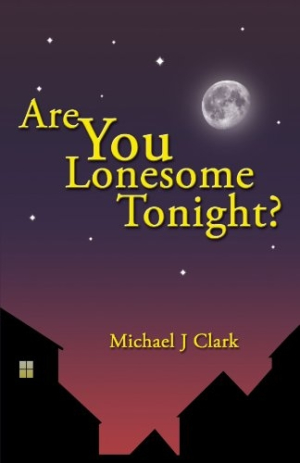Are You Lonesome Tonight?
English author Michael J. Clark’s Are You Lonesome Tonight? is a contrived—albeit zany and entertaining—tale, but it may miss its mark with American audiences. The main story is about two men, born and raised in New York state, who take their families on vacation to Disney World in Orlando, Florida. Unfortunately, far too many of Clark’s details are simply wrong, and some perpetuate offensive stereotypes. The result is disappointing.
Those unfamiliar with British terms may be confused by some of Clark’s jargon. For instance, the main characters were high school classmates, but Clark uses “high school” interchangeably with “college.” His use of “Quiff,” “French pleat,” “precinct,” “smart,” “torch” and numerous other words may be similarly puzzling. When the characters can “hardly contain themselves from…letting out a giant ‘Yuba Dabber Do,’” or can’t wait to go on the “Helter-Skelter rides,” it is reasonable to wonder why Clark didn’t make his characters English rather than American. Except perhaps for diehard Beatles fans, few in America have heard of a Helter-Skelter ride. The author is entitled to use any terms he chooses, but his characters do not come across as American born and raised. That one family now lives in Canada is not enough of an explanation.
More serious than the British-English issues are the incorrect and often offensive particulars Clark provides. That the main characters incessantly call one another “partner” brings to mind the worst of old cowboy films. And the impression is only reinforced by descriptions about people “whooping and yelping, like a bunch of cowhands having just hit town,” or sitting in a bar “like a couple of old gunfighters…in the last chance saloon, waiting for the Marshall to push through the swinging doors.” Even worse, Clark writes that, “God knows what tonight will bring, (we’ll) probably (be) captured by a pack of runaway Apache Indians.” In a scene set in a lower-income neighborhood, which Clark calls “back street slums,” the unwitting vacationers encounter “frightening looking ethnics,” and in a hidden spot near the beach, the travelers make friends with “a bunch of old tramps,” whom they wish they could “reach down to and help.” Giving a Colombian drug lord the unlikely name Almed Ali Mohammed feels equally offensive. Further, Clark apparently has no knowledge of police operations in the United States, let alone in Orlando. His ignorance of jurisdiction, rank, and procedure, combined with his portrayal of the police as bumbling, inept idiots, does not help his case.
Are You Lonesome Tonight? could be so much more. The basic story is charming. It would be easy to enjoy, despite its unlikely premise, if the characters themselves made sense. With the American setting and American-born protagonists, it is not unrealistic to expect a certain degree of accuracy in the details. The book is further hampered by awkward phrasing, verb-tense errors, and the misuse of words like perpetrating and statuesque, and the confusion of whose and who’s. Lack of proper punctuation (“I’ve got no appetite I can’t eat,” “Who knows maybe it was Chad”) results in sentences that are unintentionally silly or difficult to follow. An editor can correct errors in the text, but only research can help address the book’s larger problems. Clark’s book may appeal to an English audience unfamiliar with the United States, but American readers are not likely to be satisfied.
Reviewed by
Cheryl Hibbard
Disclosure: This article is not an endorsement, but a review. The publisher of this book provided free copies of the book and paid a small fee to have their book reviewed by a professional reviewer. Foreword Reviews and Clarion Reviews make no guarantee that the publisher will receive a positive review. Foreword Magazine, Inc. is disclosing this in accordance with the Federal Trade Commission’s 16 CFR, Part 255.

